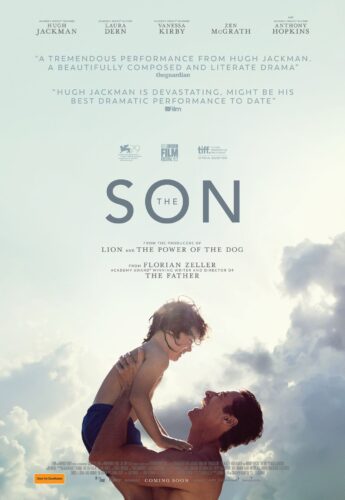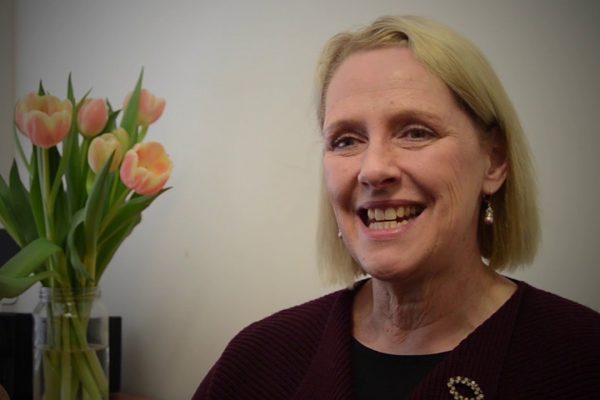Fr Peter Malone is well known to many of us. Born in Sydney and a priest of the Missionary of the Sacred Heart since 1965. He has taught theology and scripture at Yarra Theological Union and was a director of the Australian Catholic Film Office in the 1990’s and president of the International Catholic Organisation for Cinema and Audio Visuals of which he became World President from 1998-2001. Peter was also the first president of SIGNIS, World Catholic Association for Communication from 2001-2005, is a writer of many books and a world renowned film critic. Fr Peter will be providing our parish with monthly updates into the world of cinema and starts the year with a review of The Son.

The Son
UK/US, 2022, 123 minutes, Colour.
Cast: Hugh Jackman, Laura Dern, Vanessa Kirby, Zen McGrath,
Directed by Florian Zeller.
When seeing the plain, bold title, The Son, many audiences will remember the equally bold title, The Father, the award-winning film of 2020, winning Anthony Hopkins his second Best Actor Oscar. While there have been many films about ageing and Alzheimer’s, The Father takes its place as one of the best of them. The audience was immersed in the central characters continual bewilderment, experiencing Alzheimer’s through their empathy with the father. The Father is currently available through SBS on demand.
Now, with a focus on a teenage son, the issues are more complex – although we might recognise the depressive behaviour of Nicholas (Melbourne actor Zen McGrath) before his parents belatedly realise their son’s condition. There has been some criticism of Zen McGrath’s performance, calling it one-note. But, how else does an actor communicate the inner depths of confusing depression, the loss of any zest for life, wishing out of life?
But, before we are introduced to the son, we are introduced to the parents. The film is, in fact, a star vehicle for Hugh Jackman (originally a Sydney actor) who is able to combine charm with being unable to appreciate his son’s condition and how best to help. He is Peter, married for the second time, his wife is Beth (Vanessa Kirby, whose performance as a pregnant woman in Piece of a Woman should be seen). They have a newborn son. Then we meet Kate, a passionate Laura Dern and, Peter’s ex-wife with whom Nicholas lives. She is in some anguish because she discovers he does not go to school, does not want to live with her anymore.
And so, the stage is set for an exploration of adolescent mental illness, its effect on a teenager’s life, a more than melancholy grip from the inside, a longing for escape from this pressure of life. And the stage is set for relationships between parents and son, loving, yet inadequate, not perceptive, the parents dismayed as they discover more and more about the inner life of their son.
There is a powerful sequence when Peter visits his politically ambitious and successful father, Anthony Hopkins, whose only advice to his bewildered son is to get over himself, leaving Peter to wonder whether he is now repeating the patterns of his father’s treatment of him.
Then there is the profound issue of the effect on a child of the parents’ divorce.
Many audiences will bring their own and family experiences to this film, assessing the portrait of a depressed teenager, silent, sullen, taciturn, avoiding all responsibilities, cutting himself, wishing himself out of life. Some have been critical of how realistic this portrait is. Others, surrendering themselves to the characters and their uncertainties, their searching, will be caught up emotionally. Depending on age, perhaps, younger audiences well be empathetic towards the son. Older audiences, particularly parents and, more particularly, parents with adolescent children, will be empathetic towards the mother and father. They are trying to do their best, but they discover their best is inadequate. Then there is the further complication of Nicholas moving in with his father and Beth, the little brother, and Beth becoming more and more aware of Nicholas’s condition.
Eventually, Nicholas spends time in hospital, the parents bewildered, Nicholas demanding to come home, and audiences being asked at the same time what decision would they make – his staying for treatment or his coming home?
The screenplay speculates at the end on what would happen if Nicholas were treated well – and if he refused treatment.
Writer-director, Florian Zeller, French playwright, working with British playwright and screenwriter of many decades, Christopher Hampton, draw us into observe the life and tragedy of The Son.
The Son is currently showing at various cinemas including Palace Cinemas, the Lido Hawthorn and the Rivoli Camberwell.

By Fr Peter Malone




Comments
Add Comment